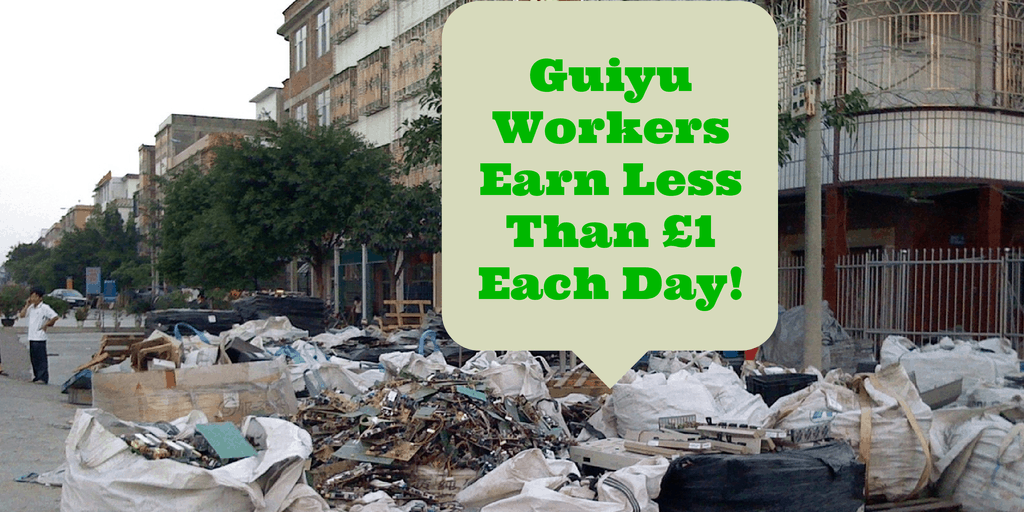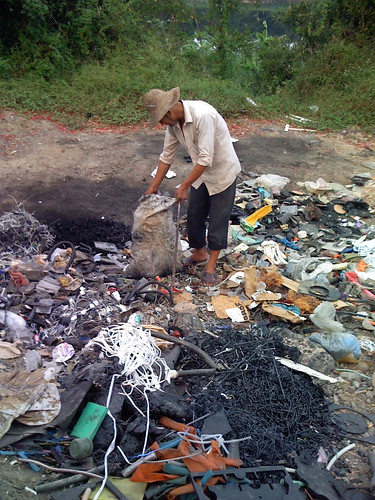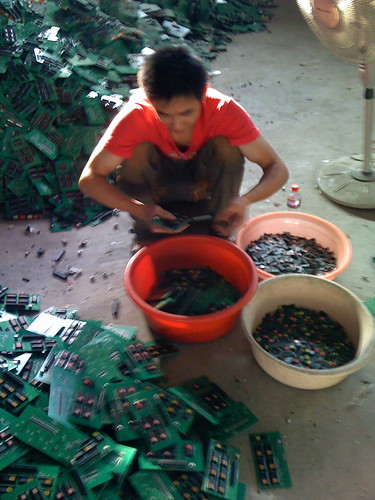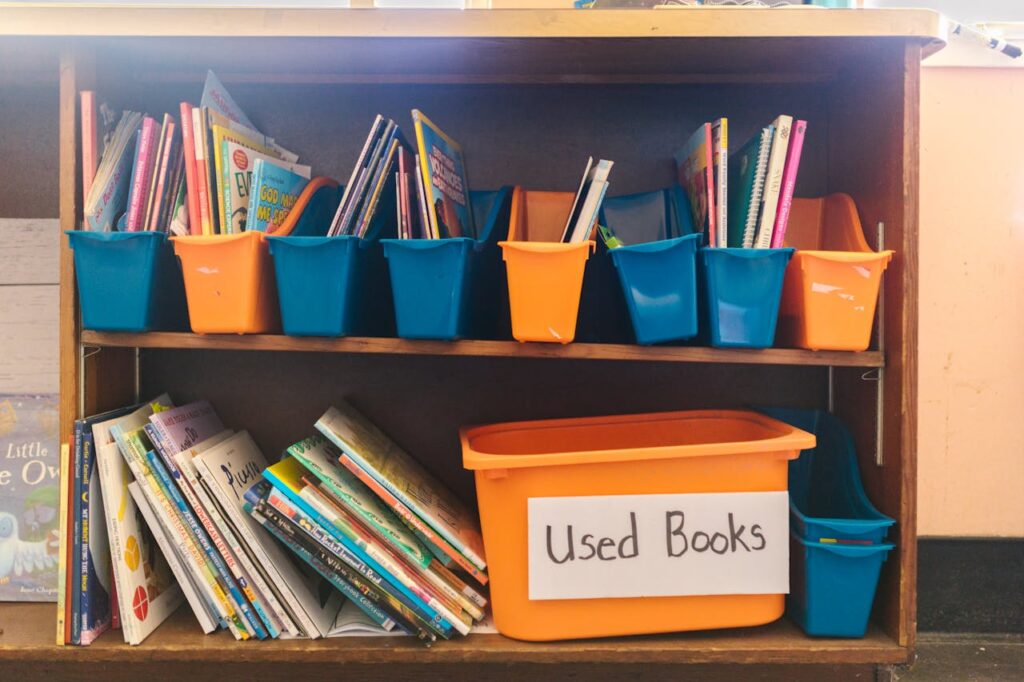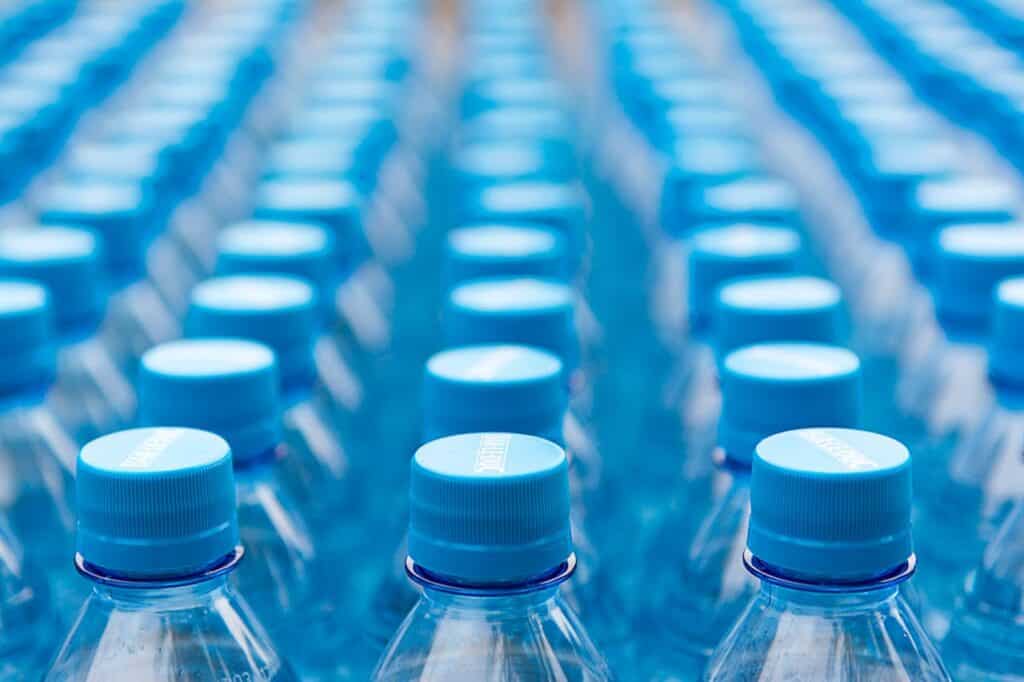Guiyu, Guangdong Province, China; taking over 100 truckloads of dead devices for metal and plastic recycling each day.
When consumers decide to upgrade their electronics, either through fault or appearance, they may not consider the afterlife of the device. Recycling provides a positive opportunity for materials to live again. Sadly, for the residents of Guiyu, the millions of tonnes of electronic waste that is dumped on their doorstep each year for metal and plastic recycling is actually harming them.
Let’s go back a few steps
When a piece of electronics is discarded, it is sent either to be repaired and resold or to be broken down into its many components. Consider a fridge for example, the chemicals within the pipes of the fridge are toxic and considerably harmful to humans and the environment, but the metal pipes are valuable. It’s a strange circular life for an eastern manufactured piece of electronics, being created in China, shipped to the west, living a full life, and then being sent back to the east when it is no longer fit for service, and then recycled. Surely there is a better way of doing things. 80% of the scrap in Guiyu is from overseas, mostly from the United States, meaning only 20% is native material for metal and plastic recycling.
In the realms of sustainability, a greener design must be thought up, accepted and implemented, not only to save the environment, but to save the lives of the residents of Guiyu. Not just Guiyu either, they are not the only e-waste graveyard, devices are sent for metal and plastic recycling in many emerging nations worldwide, such as Ghana and India. We are all for a circular economy, but this one is warped, and it is suggested that the loop needs to be closed. Electronics need to be designed with recycling and material reclamation in mind, this can be done by each part of the manufacturing, recycling and reprocessing life-line working together. Consider a television with ten different screw-types and three different types of plastic, recycling is made a lot more difficult because of this.
Damaging to life
In 2007, a medical journal titled ‘Elevated Blood Lead Levels of Children in Guiyu, an Electronic Waste Recycling Town in China’ was published. A group of scientists observed a selection of 226 children from Guiyu and the neighbouring town, Chendian. The results were fascinating and shocking, with 80% of the children from Guiyu, who have been exposed to the reclamation of materials in dump sites and workshops, showing well above average Blood Lead Levels (BLL).
The results also suggested that the older the children were, the higher their BLL would be, implying that the problem will only increase with time. By now, knowledge of lead and it’s poisonous properties are widely available. Actions such as replacing the lead in pencils with graphite, and creating ‘unleaded’ petrol have proved excellent protections to the danger of metal poisoning.
Fact: A local University in the city of Shantou has proved that Guiyu has the world’s highest levels of cancer causing dioxins and that the women have a massively increased chanced of miscarriage.
Why should the residents of Guiyu suffer lead poisoning?
The average worker in Guiyu makes about £1 a day, working a 16 hour shift, and that could be man, woman, or sadly, a child. The residents rely on this money to keep their families running, but their surely must be a better way. If they are lucky, they will be able to find mobile phones that contain small fragments of gold, silver, palladium or copper, which are more valuable than the standard minerals. Plastic recycling prices in China are rising, and so the hopes are that this system can be developed, and the quality of life improve for these people.
The sad reality is that Guiyu used to be a rice village, but with the shocking levels of pollution now, nothing can grow, and the water is undrinkable. Small, family-run workshops use coal-fires to heat circuit boards to extract metals and micro-chips, and then dump the ash in the river. There are 5,500 businesses in the process of metal and plastic recycling at this site, with over 60,000 workers and 1.5million lbs of recyclable materials passing through each year.
The act of sending all this e-waste to emerging nations is not only illegal, but has been described as ‘environmental racism’. Until these nations refuse to take it, a solution is sadly not a high priority for decision makers, and seeking out those shipping the electronics away isn’t either. These emerging nations must implement guidelines, support the development of an infrastructure and increase prices so that they cannot be extorted by the big guys.
Here’s a fact to leave you with: Some of the e-waste is new and unused. Since it never sold, it is sent to be recycled for a second attempt as a product. Shocking.

